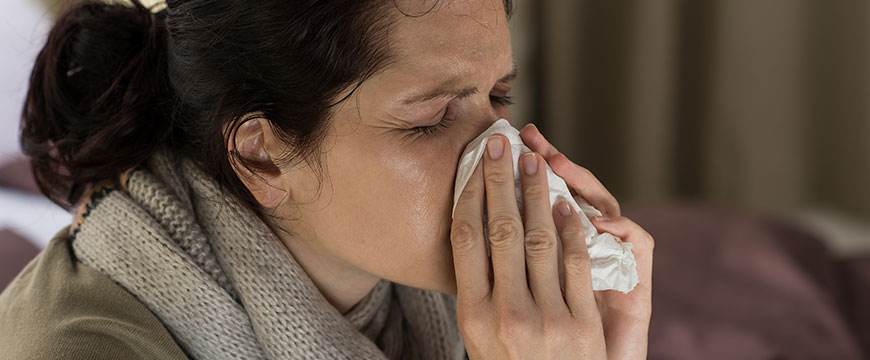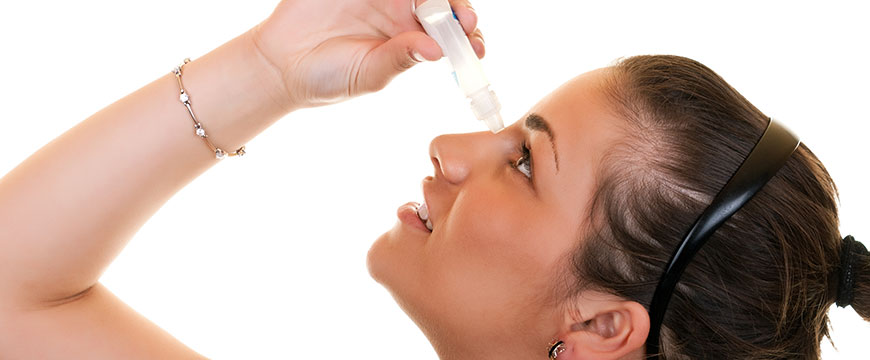
If you suffer from allergies and the allergy season is coming, you can do several things to make the season more forgiving.
Buy medication
If you suspect that your symptoms may worsen, your usual medications may not work either, so you may need to try new ones or combine them to find relief.
Several over-the-counter and prescription treatments are available to alleviate allergy symptoms. Many doctors recommend nasal steroid sprays like Nasonex (with a prescription) or Flonase as the first line of treatment.
While they are good, they may take several days or weeks to relieve stuffiness and sneezing, so it is best to use them early in the season before your symptoms worsen.
Antihistamines, whether sprays like Astelin, tablets like Allegra, Claritin, or Zyrtec, or eye drops like Optivar, are other options as they have a more rapid effect.
Decongestants such as Afrin or Sinex come in handy. Don’t rush to use them, even if you can access them, as they can have a rebound effect.
After a few days, the blood vessels in your nose become less receptive to the drug, and you may experience severe congestion again. Limit these medications to no more than three days in a row.
If you have already tried numerous over-the-counter allergy medications, and none gives you your desired results, consult your allergy doctor about prescription choices. The allergy specialist will help you plan ahead of time for your unique allergies so you are safe when the allergy season kicks in.
Wash your sinuses
If you don’t want to take medications, consider nasal irrigation. The technique dates back thousands of years, and its efficacy is supported by plenty of studies.
You need to pour a saline solution into one nostril using a neti pot, bulb syringe, or squeeze bottle and let it drain out the other.
The procedure is simple but helps flush out pollen, mucus, and other allergens in your nasal cavity. As a result, you may feel less congested and use less allergy medicine if you have to.
Plan your outdoor time accordingly.
Many well-known weather apps and websites offer “allergy forecasts” or pollen counts. The National Allergy Bureau website lists more than 80 stations around the United States that provide more specific daily pollen reports depending on different plant types.
You can choose the station closest to you and receive notifications for your pollen allergy.
Pollen counts are often highest between early morning and midmorning and on hot, dry, windy days. You can limit the quantity of pollen you come into contact with if you exercise indoors during certain times or run errands later in the evening.
If you are prone to allergy symptoms and need to go out in the morning or do yardwork, don a high-quality N95 mask, which you may already have for coronavirus protection. This will aid in pollen removal.
Reduce the pollen in your home.
Avoid bringing pollen back inside after being outside. When you arrive home, take your shoes off and change your clothes. Shower before bed to eliminate pollen from your skin.
As much as you love them, avoid sleeping with your dogs. Even if you aren’t allergic to your pets, pollen is on their coats, which might cause you to react.
To improve your sleep, try zipping up your mattress and pillows in hypoallergenic encasements, washing bedding once a week in hot soapy water, and using a dryer instead of a clothesline.
You also should make it a habit of cleaning and replacing your air conditioner filter with one with a MERV of 11 or higher.
These filters can capture small pollen particles. If you suffer from severe allergies, consider investing in a professional-style HEPA (high-efficiency particulate air) filter for your bedroom.
HEPA filters with a MERV value of 17 or higher often remove 99 percent of pollen, animal dander, dust, and other particles, leaving your house’s insides safe and allergen-free.
You also should try to close your windows and use an air conditioner. If, on the other hand, you are allergic to indoor allergens such as mold and dust, open the windows and allow in fresh air to help eliminate allergens from your home.
Try immunotherapy
If allergies interfere with your daily life, you should speak with your doctor about immunotherapy for long-term relief.
After a skin prick test or blood test confirms which pollen you are allergic to, your doctor may offer subcutaneous allergy immunotherapy, also known as allergy shots.
This entails a series of injections every week or month, including trace amounts of the pollen to which you are allergic. The dose progressively increases, making your immune system less sensitive to the allergen.
The Food and Drug Administration has begun to approve another type of immunotherapy known as sublingual immunotherapy.
Here tiny amounts of pollen are delivered in tablet form, and you place them under the tongue for one to two minutes before ingesting them. While studies are still ongoing, the only medications that are now approved are for allergies to dust mites, ragweed, and northern pasture grasses. At the same time, other tablets are being examined in clinical trials.
Patience is required for both types of immunotherapy. In most cases, symptom relief could take six months to a year. However, you may need to continue the medication for up to five years before your body can reliably ignore your triggers.
Immunotherapy may be great when it works. If you have been suffering from yearly stuffy noses and itchy eyes and are after successful treatment, you should find an experienced allergy specialist to guide you.
Parting shot
These are some of the ways you can deal with seasonal allergies. To have an easy time treating the condition, don’t ignore the condition regardless of how minor the symptoms appear.
You should listen to your body and rest, go to bed early, or take a sick day. Excessive activity and running around when sick can only make you feel worse.
You also should consider visiting an allergy specialist Manassas for treatment.







